19 Dec 2013 | China, News, South Africa
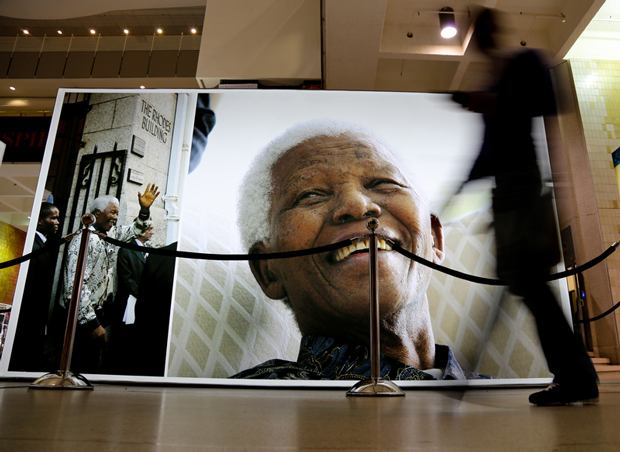
The City of Cape Town launched the Nelson Mandela Legacy Exhibition to honour his contribution to South Africa’s democracy. The exhibiton is a collection of historic photographs and visuals capturing significant moments in Mandela’s life. (Photo: Sumaya Hisham / Demotix)
Chinese coverage of Nelson Mandela’s death has reflected the government’s new-found sympathy for Maoism, its rejection of democracy and its long-standing sensitivities over Tibet and Taiwan.
When Nelson Mandela died, the official statement from President Xi Jinping praised Mandela as “an accomplished politician of global standing,” while state-owned China Central Television described him as “an old friend of China”.
This was to be a precursor for the following day’s censorship — which banned coverage referencing “freedom”,“democracy”, Mandela’s Nobel Peace Prize and foreign policy hot topics Tibet and Taiwan.
While President Xi Jinping did not attend Mandela’s funeral himself, his Vice President Li Yunchao did, and was booed by crowds as he made his memorial speech.
Xi commented on Mandela’s bright smile, called him a “towering figure” and “an old friend of China”. There was no mention of “freedom” or “democracy”.
In an op-ed for CNN, deputy director of Asia division for Human Rights Watch Phelim Kene argued that the deliberate omissions in official statements, as well as the selective censorship policy, was a ploy to distract attention away from China’s own Nobel Peace Prize-winning freedom and democracy activist, Liu Xiaobo.
In 2009, democracy activist Liu was charged with inciting subversion and sentenced to 11 years in prison. His name has since been banned from Chinese micro-blogging sites, although the state-owned Chinese newspaper Global Times broke the ban recently to issue a seething counter-West editorial, accusing American editors of falsely painting Liu as “China’s Mandela”.
According to The Global Times, outlets like The Washington Post, New York Times and CNN had deliberately focused on the imprisonment of Liu in an attempt to foster unrest.
An op-ed argued that “Mandela was awarded the Nobel Peace Prize for leading African people to anti-apartheid victory through struggle, tolerance and efforts to bridge differences,” while Liu had “confronted authorities” and “was dealt with under strict legal procedures. This system ensures that a society of 1.3 billion people runs smoothly.” The piece also argued that “mainstream Chinese society” had rejected Liu’s campaign for democracy.
Yet the circumstances of two men’s imprisonment remain remarkably similar. Mandela was charged and sentenced after he helped produce South Africa’s pro-democracy “Freedom Charter”. Liu, similarly, is one of the activists who drafted “Charter ‘08”, a manifesto for Chinese democracy. Families of both men were persecuted by the state and censorship departments in both countries attempted to remove all mention of the dissenters from the media (including previously written works).
Promotion of Mao’s legacy seems to be Xi Jinping’s communications strategy of choice — and it appears Mandela’s death has been co-opted into this “Maoisation” of Chinese politics. State press releases asserted that Mandela had read Mao’s “Little Red Book” while imprisoned on Robben Island, as well as describing himself as a “student of Mao”.
Mandela was certainly a fan of Mao, though principally for his military strategies rather than his later domestic policies. In a TIME Magazine interview, he praised the tactics used during the “Long March”, as well as his “determination and non-traditional thinking,” which Mandela briefly noted in his autobiography Long Walk to Freedom.
Overall, the Chinese press complied with censorship restrictions to censor the words “freedom” and “democracy” from accounts of Mandela’s life and death, as well as steering clear of Tibet and Taiwan, both contentious foreign policy issues that Mandela had previously weighed in on. Under his presidency, South Africa cut off ties with Taiwan over its previous support for Apartheid, and in favour of Communist mainland China.
Mandela had also met with the Dalai Lama on several occasions, who issued a video tribute to Mandela. The Tibetan leader has been refused a visa to visit South Africa twice in the last four years, regarded by many as an attempt not to risk diplomatic relations with China.
A dictat from China’s Foreign Ministry also attempted to censor “posts and comments on Weibo that take advantage of Mandela’s funeral to attack our political system and state leaders”, ordering offending content to be deleted immediately.
Property tycoon Ren Zhiqiang commented on Weibo: “Because he was a fighter — for all his life— for democracy, equality and peace and harmony, he is now an icon of all these.” Another user, from Shanxi, wrote “A great leader, rest in peace.”
Some Weibo users employed sarcasm to express their views. In response to philanthropist Fan Wei asking “Will China have its own Mandela?” one user replied, “Heroes only appear in turbulent times. In our ‘harmonious’ homeland, there is no use for Mandelas.” Another simply said, “They are in prison.”
“Old friend?” another user mocked. “He pursued justice, fairness and freedom. Does he have anything to do with you? Don’t blow your own trumpet.”
Notably, the so-called “New Left” Maoists reacted hotly to the government’s comparisons, with Weibo messages strongly in favour of Mao Zedong over Mandela.
“India’s Gandhi and South Africa’s Mandela were great. But Chairman Mao surpassed them all,” said one.
Another commented, “Mandela had bowed to racism. His consideration of the Tibetan independence movement as a human rights movement was a big, big mistake. He is a banana with dark skin.”
The death of Mandela has also resurrected an unlikely pop song from the 1990s. The Hong Kong-based band Beyond surged back into the charts with their song “Glorious Days”, reaching number one after almost a decade of hiatus.
“Glorious Days” had already achieved chart success in the post-Tiananmen era, when many were afraid to discuss political issues. Released in the midst of a music scene that mainly comprised of love songs, the Cantonese pop band achieved record sales with a song about racial equality, which was dedicated to Nelson Mandela.
This article was published on 19 Dec, 2013 at indexoncensorship.org
9 Dec 2013 | Volume 42.04 Winter 2013
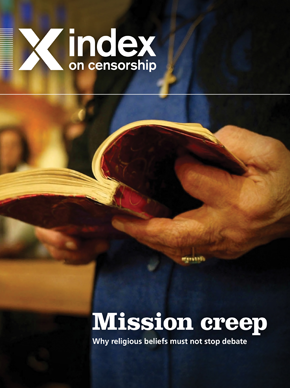 The upcoming winter issue of Index on Censorship magazine includes a special report on religion and tolerance, with articles from around the world.
The upcoming winter issue of Index on Censorship magazine includes a special report on religion and tolerance, with articles from around the world.
Writers include the Bishop of Bradford, Salil Tripathi, Samira Ahmed and Kaya Genc. There’s an interview with Gurpreet Kaur Bhatti ahead of the opening of her new play, and 10 years after Behzti; while cartoonist Martin Rowson writes and draws about how comedy and religious offence come into conflict. Natasha Joseph writes from South Africa on why some portraits of President Zuma made him see red. Alexander Verkhovsky discusses the new blasphemy law in Russia, and former BBC mobile editor Jason DaPonte discusses why computer games are not all bad.
As part of the special report, writer Brian Pellot goes online with the Mormons to see how they use technology to talk to the unconverted, and asks if online chats will replace missions. Germans have been outraged by the revelations about US and UK surveillance, now they have plans to do something different to put a stop to snooping in the future, Sally Gimson reports. From Brazil, Ronaldo Pelli looks at the reaction to people practising religions of African origin, and investigative writer and author of Fast Food Nation Eric Schlosser talks about the threats to investigative journalism now and in the future.
Also in this issue:
Padraig Reidy on flags, controversy and Northern Ireland
Xiao Shu on the Chinese crackdown on the New Citizens’ Movement
Kaya Genc on the rise of a new type of media in Turkey
18 Nov 2013 | Magazine
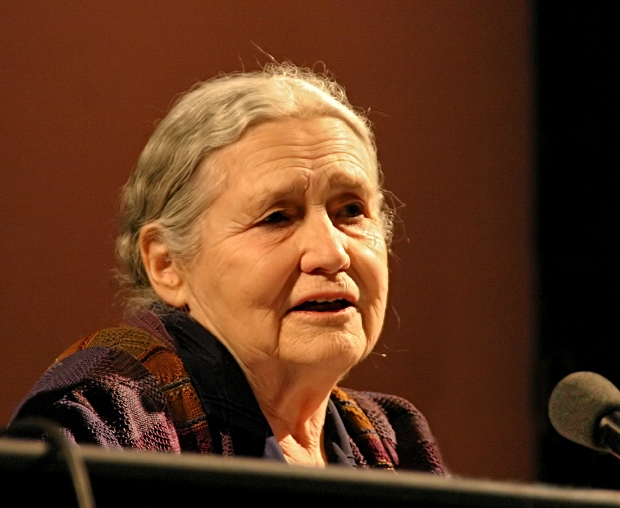 Recent revelations about conditions inside China’s Gulag camps by a former prisoner make the impressions of privileged visitors seem almost frivolous. Yet what we found was unexpected and, at the very least, a witness to China’s capacity for change.
Recent revelations about conditions inside China’s Gulag camps by a former prisoner make the impressions of privileged visitors seem almost frivolous. Yet what we found was unexpected and, at the very least, a witness to China’s capacity for change.
Three of us, Michael Holroyd, Margaret Drabble and myself, went to China for the British Council, as guests of the main writers’ organisation, for over two weeks. Each of us was independently told that we would find sullen, unsmiling populations who would surround us and stare, and who were afraid to speak to foreigners. They would also spit everywhere all the time.
An American journalist who has worked in Beijing for five years said all this was true, up to three years ago: people were so afraid of drawing attention that even the bicycle bells were muted.
We went to Beijing, Shanghai, Shian and Canton (now Guangdong), all full of tourists from Europe, but even more from Japan, South Korea and other adjacent countries. We found smiling, laughing, robust and friendly people who did not spit, did not stare and were concerned with foreigners only to be helpful, to make money out of us, or to learn to make money.
The students in the universities were well informed about British and American literature and at least as sophisticated as their American counterparts.
This is a country on the make, determined to do well, full of energy, confidence, competence. We did not see one drunk person. Every city greets you with slogans like ‘China welcomes you with a billion smiles’.
As for being afraid, everyone talks freely about everything, particularly the Cultural Revolution. The euphoria of the times is such that people will say confidently there is no poverty in China (perhaps hoping there soon won’t be), yet if you walk down a minor street in Shanghai or Beijing there are the bare rooms where whole families are putting themselves to bed under a naked electric light bulb, reminding me of the ‘brick lines’ in Africa. The gap between rich and poor must surely widen.
My most informative encounter was with a group of magazine editors and writers, in their thirties and forties. We met publicly at a Friendship Restaurant. When I commented that to the outside world China gives the impression of continuous 100% swings in policy, with the implication that this was a swing to liberalism, and why weren’t they afraid their now so open criticisms might be held against them, they said, ‘What liberalism?’
Clearly they had expected more from China’s glasnost. They told me of a friend’s novel about conditions in the Chinese army, which are every bit as bad as those in the old Soviet army.
Yet controversial books are published: Jung Chang’s Wild Swans, already published abroad in translation, is expected soon. With a certain scepticism, however. A democratic writer, the idol of youth, has upset the literary establishment with her irreverent, rude, crude stories and poems, but they are forced to accept her because of her popularity. She has not been prohibited nor censored. In short, the situation is fluid. Novels and stories about the
Cultural Revolution are plentifully printed.
We met hardly anyone who had not suffered; even the highest were affected — for instance, the former Minister of Culture, Wang Meng. At that private encounter at the Friendship Restaurant every person around the table told what had happened to them.
When asked what he felt about being defamed and tortured in prison, one replied that the victims were, at other times, themselves the victimisers.
The Cultural Revolution is thought of by us as a war against people, but the young iconoclasts also destroyed orchards, gardens, even mulberry trees and silkworks, let alone temples and shrines. In a traditional courtyard in
Beijing the little stone lions that often guard homes had all had their heads knocked off. When with these lively, sensible, practical, humorous people, it is not easy to hold in one’s mind the knowledge that these same people, just like oneself and one’s friends, were so recently part of that lunacy; or that the entire population was willing, at a word from Chairman Mao, to stand — for hours, or days — beating pots and gongs to prevent birds from landing anywhere so that they fell out of the sky dead or so weak they could be clubbed to death — in myriads, in billions. Birds had been categorised as pests. So few birds are left in China; any wild bird you do see is in a cruel cage.
Two phenomena, both much discussed, seem portents of danger to the country. One is the 100 million people forced off the land by mechanisation, all on the move. But ‘what is 100 million?’ seems to be the feeling. They will be absorbed. These displaced ones do casual labour, pilfer, are petty traders or become bandits on an old and familiar model. They can always go back to their villages — so it is said — where they will be looked after.
But for how long will these people be regarded as the responsibility of their villages when they contribute nothing? At a farm near Guangdong (the city is like a vast building site, and the traffic horrendous, so the 10-mile journey took two-and-a-half hours each way) they told us that 10 years ago every member of the couple of hundred villagers had worked on the farm, but now 15 people did all the work. The others were working as labourers in the building industry. This is a revolution of traditional China so profound it must make previous revolutions seem like minor upheavals. In this village we were proudly shown the loudspeaker that not long ago howled out Party directives or banged out loud martial music nearly all the time. Now it was silent.
The other thing everyone talks about is what they call ‘The Little Emperor problem’. The law that there must only one child per family is more or less enforced in the cities, sometimes with cruel pressure. Everywhere you see wonderful babies and little children, each one being adored by attendant grownups. Each is a little emperor (or empress, but, it seems, fewer of them) who gets the best of everything, from love to education. But in the provinces it is not so easy to enforce the law, and there are many farmers, number unspecified, who have three or four children.
These are badly educated or not educated at all, and will always be poor, unless China decides to educate and feed them, but that would mean a reversal of a policy regarded as essential — the curtailment of population.
Once again, as before in China’s history, ignorant and poor peasants will look in at the privileged towns, full of their rich and educated contemporaries.
We did not go into the poor parts of China. Our guide said confidently that there were no poor areas, no poor farms. She did not know there was controversy over Tibet, which was a place where she and friends talked of taking a holiday. She was well educated, and demonstrated one of the reversals of policy when she recited the list of Chinese dynasties from their beginning, long before Christ, or even Confucius.
Until recently, history taught in schools began with Communism: the imperial past was ignored.
It seemed to me during this trip, and remains with me now, that the most astonishing thing is that five years ago, less, it meant prison or torture or even death for conversations of the kind we were having, so easily, at all levels. But that loudspeaker on the roof of the communal hall on the farm had not been removed, only switched off.
China makes me think of a great lumbering farm cart that has had the most modern of engines fitted to it and is rattling along at 50 miles an hour instead of five. Rushing ahead it certainly is; but the strains and stresses may, almost certainly will, again and again slow or check the cart, even change its direction in unexpected ways.
As China grows strong it will influence the whole world. Let us hope its way of reducing everything to simple and simple-minded formulae does not catch on. The successes of Political Correctness show that we should not be too confident.
This article was originally published in Index on Censorship magazine, September 1993.
Click here to subscribe to Index on Censorship magazine, or download the app here
7 Nov 2013 | Africa, News
1) Angola
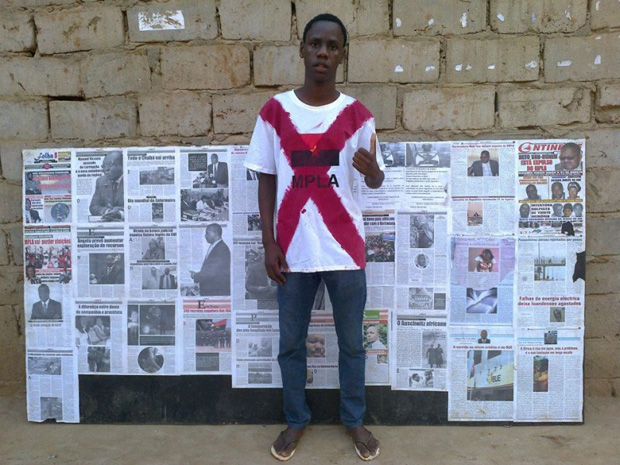
Manuel Chivonde Nito Alves was held in solitary confinement for printing t-shirts. Image from his Facebook page.
Angolan 17-year-old Manuel Chivonde Nito Alves went on hunger strike on Tuesday, following his arrest on 12 September for printing t-shirts with the slogan “Out Disgusting Dictator”. The message was aimed at the country’s President Jose Eduardo dos Santos, who has held power in since 1979. The shirts were to be worn at a demonstration in the capital Luanda, highlighting corruption, forced evictions, police violence and lack of social justice under dos Santos’ regime. Nito Alves has been charged with “insulting the president”, and has now spent almost two months in detention – parts of it in solitary confinement. His family were barred from seeing him, and three weeks went by before he was allowed to speak to a lawyer. The hunger strike is in protest at his “unjust and inhumane treatment”.
2) Belarus
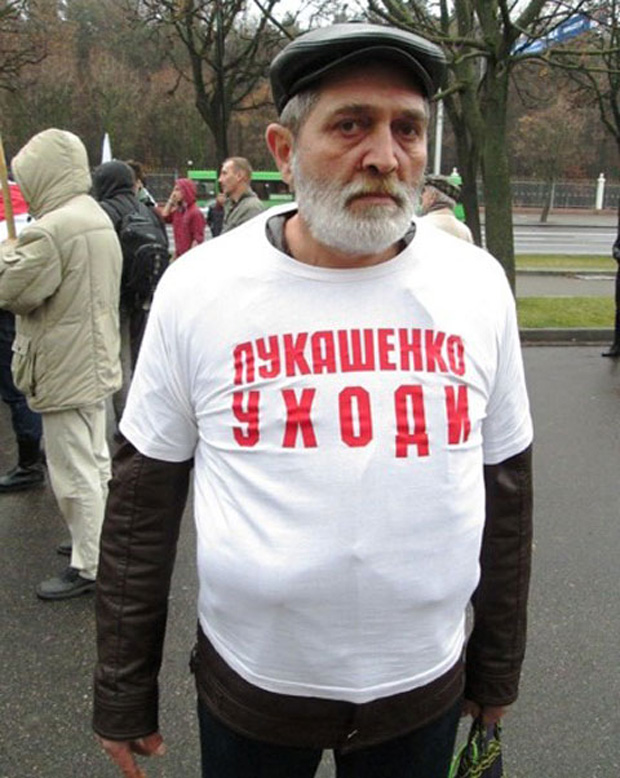
Yury Rubstow wearing the t-shirt that landed him in prison. (Image Viasna Human
Rights Centre)
On Monday, Belarusian opposition activist Yury Rubstow was sentenced to three days in jail for wearing a t-shirt with the slogan “Lukashenko, go away” on the front, and “A four-time president? No. This is not a president but an impostor tsar” on the back.” The message was aimed at the country’s dictator Alexander Lukashenko, during an opposition protest march. He was found guilty of disobedience to police officers under Article 23.4 of the Civil Offenses Code.
3) Swaziland
In 2010, Sipho Jele, a member of Swaziland’s People’s United Democratic Movement, was arrested for wearing a t-shirt supporting the party during a May Day parade. He was arrested under the country’s Suppression of Terrorism Act, and died in custody. The police said he had hanged himself, while the party say the police of killed him.
4) Egypt
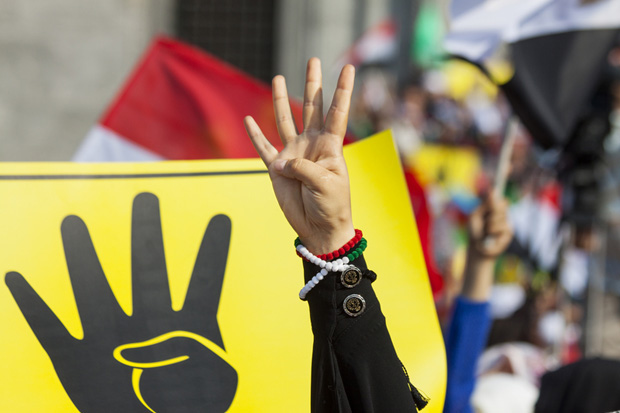
The Rabaa symbol displayed at a protest in Turkey (Image Bünyamin Salman/Demotix)
In September, three Egyptian men were arrested for wearing t-shirts emblazoned with the Rabaa symbol. A hand holding up four fingers, it is widely used by those opposing Egypt’s interim military-backed government, and the coup that ushered in in. Mohamed Youssef, the country’s kung fu champion, was also suspended by the national federation for wearing a similar t-shirt during a medal ceremony.
5) Hong Kong
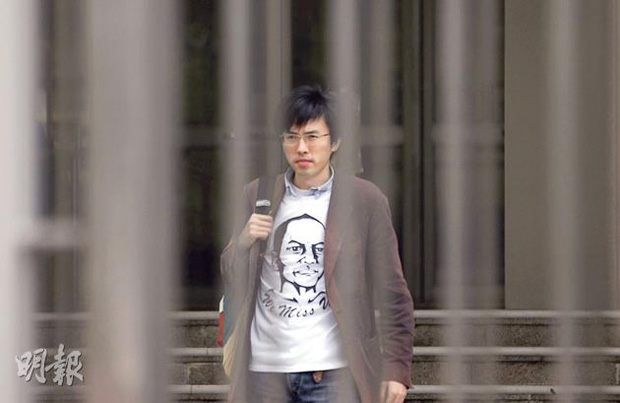
Avery Ng wearing the t-shirt he threw at Hu Jintao. Image from his Facebook page.
An activist from Hong Kong was arrested last December for throwing a t-shirt at former Chinese president Hu Jintao during an official visit almost six month earlier, on 1 July. League of Social Democrats Vice Chairman Avery Ng threw a t-shirt with a drawing of the late Chinese dissident Li Wangyang, a Tiananmen Square activist who died under suspicious circumstances only weeks before the visit. Ng was charged “with nuisance crimes committed in a public place”.
6) Malaysia
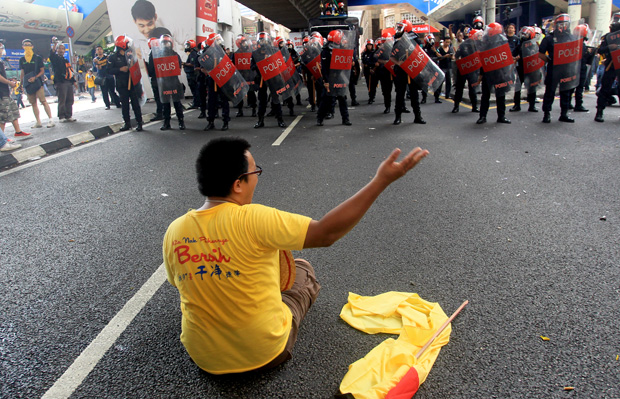
Malaysian protester wearing a Bersih shirt. (Image Syahrin Abdul Aziz/Demotix)
In June 2011, Malaysian police arrested 14 opposition activists for wearing t-shirts promoting a rally in Kuala Lumpur calling for election reform. The shirts carried the slogan “bersih” which means “clean”, and is the name of one of the groups behind the protest. Authorities claimed the demonstration was an “attempt to create chaos on the streets and undermine the government”, and they were therefore within their rights to arrest the protesters. They also confiscated t-shirts from the group’s headquarters.
7 & 8) The US

Jared Marcum wearing his NRA t-shirt in a TV report. (Image Youtube)
A 14-year-old student from West Virginia was in April suspended from school and subsequently arrested for refusing to remove a t-shirt supporting the pro-gun National Rifle Association. Jared Marcum was charged with “obstructing an officer” and faced a $500 fine and up to one year in prison.
On the flip side, a Tennessee man was arrested for wearing a t-shirt in support of stricter gun control laws. Stanley Bryce Myszka was wearing a shirt that read “Has your gun killed a kindergartener today?” at a shopping centre, following the shooting at Sandy Hook Elementary School. He was approached by security guards, who called the police when he when he refused to remove the shirt. He was also banned from the shopping centre for life.
9) United Kingdom

The front of Barry Thew’s t-shirt. (Image Greater Manchester Police)
A Manchester man was in October 2012 sentenced to eight months in prison in part for wearing a t-shirt emblazoned with offensive comments referencing the murders of two policewomen. Barry Thew had written “One less pig; perfect justice” on the front of his t-shirt and “killacopforfun.com haha” on the back. While four months of the sentence was handed down for breach of a previous suspended sentence, he was charged on a Section 4A Public Order Offence for the t-shirt incident.


 The upcoming winter issue of Index on Censorship magazine includes a special report on religion and tolerance, with articles from around the world.
The upcoming winter issue of Index on Censorship magazine includes a special report on religion and tolerance, with articles from around the world. Recent revelations about conditions inside China’s Gulag camps by a former prisoner make the impressions of privileged visitors seem almost frivolous. Yet what we found was unexpected and, at the very least, a witness to China’s capacity for change.
Recent revelations about conditions inside China’s Gulag camps by a former prisoner make the impressions of privileged visitors seem almost frivolous. Yet what we found was unexpected and, at the very least, a witness to China’s capacity for change.





